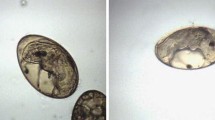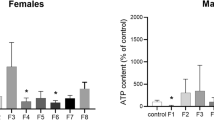Abstract
The current study was carried out to assess in vitro and in vivo effects of Moringa oleifera seed methanolic extract on Fasciola hepatica to develop an alternative source of treatment. The in vitro ovicidal effect of M. oleifera seed extract on immature F. hepatica eggs has provided evidence of inhibitory activity on the vitality and hatchability of F. hepatica eggs. This inhibitory activity was concentration-dependent and also correlated strongly with the exposure time. In the in vivo trial, the oral administration of F. hepatica experimentally infected rabbits with doses of 150 mg/kg BW prepared extract per day for 3 consecutive days on the 63rd day post infection confirmed potent fasciolicide activity of the extract. A gradual decrease in fecal egg count (FEC) was detected from the 1st day post treatment until reaching 100% FEC reduction by the 7th day post treatment. No flukes could be found at post mortem examinations. Significant increments of serum total protein, globulin, the activities of ALT and AST, total cholesterol, triglycerides and urea were recorded during the period of infection, which were improved by treatment. Remarkable histopathological alterations were observed in the infected liver and gallbladder tissues which decreased clearly in the treated rabbits. This study proposes that the used extract has promising and potent fasciolicide activity.






Similar content being viewed by others
References
Allain CC, Poon LS, Chan CSG, Richmond W, Fu PC (1974) Enzymatic determination of total serum cholesterol. Clin Chem 20:470–475
Almanzor DE, Clemente RJC, Fornillos MA, Gomez FRM, Ladiao BD, Calzada Tamodtamod R (2014) In vivo trials of Moringa oleifera Lam. extracts as antischistosomal treatment on Schistosoma japonicum infected mice. Sanghiran Multidiscip J 2:49–56
Bancroft JD, Gamble M (2002) Theory and practice of histological techniques, vol 5. Elsevier Sci, Oxford Phila, pp 130–175
Boone L, Meyer D, Cusick P, Ennulat D, Provencher Bolliger A, Everds N, Meador V, Elliott G, Honor D, Bounous D, Jordan H (2005) Selection and interpretation of clinical pathology indicators of hepatic injury in preclinical studies. Vet Clin Pathol 34:182–188
Bulus T, Addau FT (2013) Comparative antitrypanosomal screening of methanolic extracts of Khaya senegalensis and Moringa oleifera. Sci World J 8:1–6
Cabardo DE Jr, Portugaliza HP (2017) Anthelmintic activity of Moringa oleifera seed aqueous and ethanolic extracts against Haemonchus contortus eggs and third stage larvae. Int J Vet Sci Med 5:30–34
Chapman CB, Knopf PM, Hicks JD, Mitchell GF (1979) IgG1 hypergamma globulinaemia in chronic parasitic infections in mice: magnitude of the response in mice infected with various parasites. Aust J Exp Biol Med Sci 57:369–387
Chimedza JA, Graf BL, Simmler C, Kim Y, Kuhn P, Pauli GF (2017) Biochemical characterization and anti-inflammatory properties of an isothiocyanate-enriched moringa (Moringa oleifera) seed extract. PLoS ONE 12:1–20
Coppin JP, Xu Y, Chen HD (2013) Determination of flavonoids by LC/MS and anti-inflammatory activity in Moringa oleifera. J Funct Foods 5:1892–1899
Değer Y, Ertekin A, Değer S, Mert H (2008) Lipid peroxidation and antioxidant potential of sheep liver infected naturally with distomatosis. Türkiye Parazitoloji Dergisi 32:23–26
Doumas BT, Watson WA, Biggs HG (1971) Albumin standards and the measurement of serum albumin with bromocresol green. Clin Chim Acta 31:87–96
Foreyt WJ (1988) Evaluation of clorsulon against immature Fascioloides magna in cattle and sheep. Am J Vet Res 49:1004–1006
Fossati P, Prencipe L (1982) Serum triglycerides determined colorimetrically with an enzyme that produces hydrogen peroxide. Clin Chem 28:2077–2080
Gabrashanska M, Tsocheva-Gaytandzhieva N, Nanev V, Vladov I (2016) Antioxidants in the liver of Fasciola hepatica infected rabbits after mixed basic salts application. In: Proceedings of the Seventh Workshop of Experimental Models and Methods in Biomedical Research, 16–18 May, Sofia, Bulgaria, EO7, pp 92–97
Gajewska A, Smaga-Kozłowska K, Wiśniewski M (2005) Pathological changes of liver in infection of Fasciola hepatica. Wiad Parazytol 51:115–123
Georgieva K, Georgieva S, Mizinska Y, Stoitsova SR (2012) Fasciola hepatica miracidia lectin binding and stimulation of in vitro miracidium-to-sporocyst transformation. Acta Parasitol 57:46–52
Ghasi S, Nwobodo E, Ofili JO (2000) Hypocholesterolemic effects of crude extract of leaf of Moringa oleifera Lam. in high-fat diet fed Wistar rats. J Ethnopharmacol 69:21–25
Harborne JB (1984) Phytochemical methods, 2nd edn. Chapman and Hall, New York
Hegazi AG, Abd El Hady FK, Shalaby HA (2007) Inhibitory effect of Egyptian propolis on Fasciola gigantica eggs with reference to its effect on Clostridium oedematiens and correlation to chemical composition. Pak J Biol Sci 10:3295–3305
Henary RJ, Cannon DC, Winkleman JW (1974) Clinical chemistry principles and techniques, 2nd edn. Harper and Roe, New York
Hodžić A, Zuko A, Avdić R, Alić A, Omeragić J, Jažić A (2013) Influence of Fasciola hepatica on serum biochemical parameters and vascular and biliary system of sheep liver. Iran J Parasitol 8:92–98
Houot O (1985) Interpretation of clinical laboratory tests. Ed. by Siest, G., Henny, J., Schiele, F. and Young, D.S. Biochemical Publications, pp 220–234
Kaneko JJ, Harvey JW, Bruss ML (1992) Clinical biochemistry of domestic animals, 5th edn. Academic Press, California
Kelley JM, Elliott TP, Beddoe T, Anderson G, Skuce P, Spithill TW (2016) Current threat of triclabendazole resistance in Fasciola hepatica. Trends Parasitol 32:458–469
Kendall SB, Hebert NJ, Parfitt JW, Peirce MA (1967) Resistance to reinfection with Fasciola hepatica in rabbits. Exp Parasitol 20:242–247
Khan MN, Sajid MS, Rizwan HM, Qudoos A, Abbas RZ, Riaz M, Khan MK (2016) Comparative efficacy of six anthelmintic treatments against natural infection of Fasciola species in sheep. Pak Vet J 37:65–68
Koko WS, Galal M, Khalid HS (2000) Fasciolicidal efficacy of Albizia anthelmintica and Balanites aegyptiaca compared with albendazole. J Ethnopharmacol 71:247–252
Kumar D, Mishra SK, Tandan SK, Tripathi HC (1991) Mechanism of anthelmintic action of benzyl isothiocyanate. Fitoterapia 62:403–410
Lotfy WM, El-Morshedy HN, Abou El-Hoda M, El-Tawila MM, Omar EA, Farag HF (2002) Identification of the Egyptian species of Fasciola. Vet Parasitol 103:323–332
Maqbool A, Hayat CS, Tanveer A (2004) Comparative efficacy of various indigenous and allopathic drugs against fasciolosis in buffaloes. Veterinarski Arhiv 74:107–114
Mehta K, Balaraman R, Amin AH, Bafna PA, Gulati OD (2003) Effect of fruits of Moringa oleifera on the lipid profile of normal and hypercholesterolaemic rabbits. J Ethnopharmacol 86:191–195
Mendes EA, Vasconcelos AC, Lima WDS (2012) Histopathology of Fasciola hepatica infection in Merionesunguiculatus. Rev Patol Trop 41:55–62
Mitchell GBB (2002) Update on fasciolosis in cattle and sheep. In Pract 24:378–385
Moazeni M, Khademolhoseini AA (2016) Ovicidal effect of the methanolic extract of ginger (Zingiber officinale) on Fasciola hepatica eggs: an in vitro study. J Parasit Dis 40:662–666
Mooney B, Good JP, Hanrahan G, Mulcahy T, de Waal T (2009) The comparative efficacy of four anthelmintics against a natural acquired Fasciola hepatica infection in hill sheep flock in the west of Ireland. Vet Parasitol 164:201–205
Murthy P, Saxena K, Lakshmi V, Kushwaha V, Verma S, Sharma R (2011) Antifilarial activity of gum from Moringa oleifera Lam. on human lymphatic filaria Brugia malayi. Chron Young Sci 2:201–206
Nanev V, Vladov I, Gabrashanska M, Kandil OM, Hassan NMF, Sedky D, Tsocheva-Gaytandzhieva NT (2017) Rat spleen trace element contents undercompound effect on chronic fasciolosis basic zinc-copper compound. C R Acad Bulg Sci 70(8):1115–1120
Nassef NE, El-Kersh WM, El Sobky MM, Harba NM, El Refai Khalil SA (2014) In vitro and in vivo assessment of the effect of soybean extract on Fasciola gigantica infection in comparison with triclabendazole. Menoufia Med J 27:93–102
Patton CJ, Crouch SR (1977) Calorimetric determination of urea. Anal Chem 49:464–469
Paulo RC, Roberta FJC, Celina WM, Carlos d’ AMF (2010) Histamine, histamine receptors and antihistamines: new concepts. An Bras Dermatol 85:195–210
Poljakova-Krusteva O (1970) Pathogenic studies of hepatic changes in different hosts experimentally infected with Fasciola hepatica. Ph. D. Thesis, Bulgarian Academy of Sciences, Sofia, 6–69 (in Bulgarian)
Reitman SMD, Frankel S (1957) A colorimeter method for determination of serum glutamic oxaloacetic acid and glutamic pyruvic acid transferases. Am J Clin Pathol 28:56–63
Roweliffe SA, Ollerenshaw OB (1959) Observations on bionomics of the eggs of Fasciola hepatica. Ann Trop Med Parasit 54:172–181
Saini RK, Sivanesan I, Keum YS (2016) Phytochemicals of Moringa oleifera: a review of their nutritional, therapeutic and industrial significance. Biotech 6:203
Shalaby HA, El Namaky AH, Kamel ROA (2016) In vitro tegumental alterations on adult Fasciola gigantica caused by mefloquine. J Parasit Dis 40:145–151
Singh A, Singh DK, Misra TN, Agarwal RA (1996) Molluscicides of plant origin. Biol Agric Hortic 13:205–252
Solana MV, Meray Sierra R, Scarcella S, Neira G, Solana HD (2016) In vivo assessment of closantel ovicidal activity in Fasciola hepatica eggs. Exp Parasitol 160:49–53
Taleb DF, Soliman EK, el-Khalek A (2007) Effect of fascioliasis on hematological, serum biochemical and histopathological changes in sheep. Egypt J Sheep Goat Sci 2:15–34
Tayo GM, Poné JW, Komtangi MC, Yondo J, Ngangout AM, Mbida M (2014) Anthelminthic activity of Moringa oleifera leaf extracts evaluated in vitro on four developmental stages of Haemonchus contortus from goats. Am J Plant Sci 5:1702–1710
Trinder P (1969) Enzymatic methods for glucose determination. Ann Clin Biochem 6:24–28
Tsotetsi AM, Njiro S, Katsande TC, Moyo G, Baloyi F, Mpofu J (2013) Prevalence of gastrointestinal helminths and anthelmintic resistance on small-scale farms in Gauteng Province, South Africa. Trop Anim Health Prod 45:751–761
Ullah R, Rehman A, Zafeer MF, Rehman L, Khan YA, Khan MAH, Abidi SMA (2017) Anthelmintic potential of thymoquinone and curcumin on Fasciola gigantica. PLOS ONE 12(2):e0171267. https://doi.org/10.1371/journal.pone.0171267
Vargas-Magaña JJ, Torres-Acosta JFJ, Aguilar-Caballero AJ, Sandoval-Castro CA, Hoste H, Chan-Pérez JI (2014) Anthelmintic activity of acetone–water extracts against Haemonchus contortus eggs: interactions between tannins and other plant secondary compounds. Vet Parasitol 206:322–327
Acknowledgements
This work was funded from a co-project between the Academy of Scientific Research in Egypt and the Bulgarian Academy of Science, entitled “Recent studies of pathogenetic mechanism of neoplastic fasciolosis and advanced control methods.”
Authors’ contributions
OMK designed, supervised and directed the experiment. VN, NT, and MG carried out the experimental infection to provide metacercaria. OMK, NMFH, DS, EBA, and HAS conducted the in vitro and in vivo experiments and the laboratory work of the samples. SA performed the biochemical and histopathological studies. OMK, NMF, DS, EBA, SNA and HAS analyzed and discussed the resultant data. OMK, NMFH and HAS implemented writing the manuscript. OMK and NMFH revised and reviewed the manuscript for publication. All authors read and approved the final manuscript.
Author information
Authors and Affiliations
Corresponding author
Ethics declarations
Conflict of interest
The authors declare that they have no conflict of interest.
Rights and permissions
About this article
Cite this article
Kandil, O.M., Hassan, N.M.F., Sedky, D. et al. Anthelmintic efficacy of Moringa oleifera seed methanolic extract against Fasciola hepatica. J Parasit Dis 42, 391–401 (2018). https://doi.org/10.1007/s12639-018-1014-y
Received:
Accepted:
Published:
Issue Date:
DOI: https://doi.org/10.1007/s12639-018-1014-y




